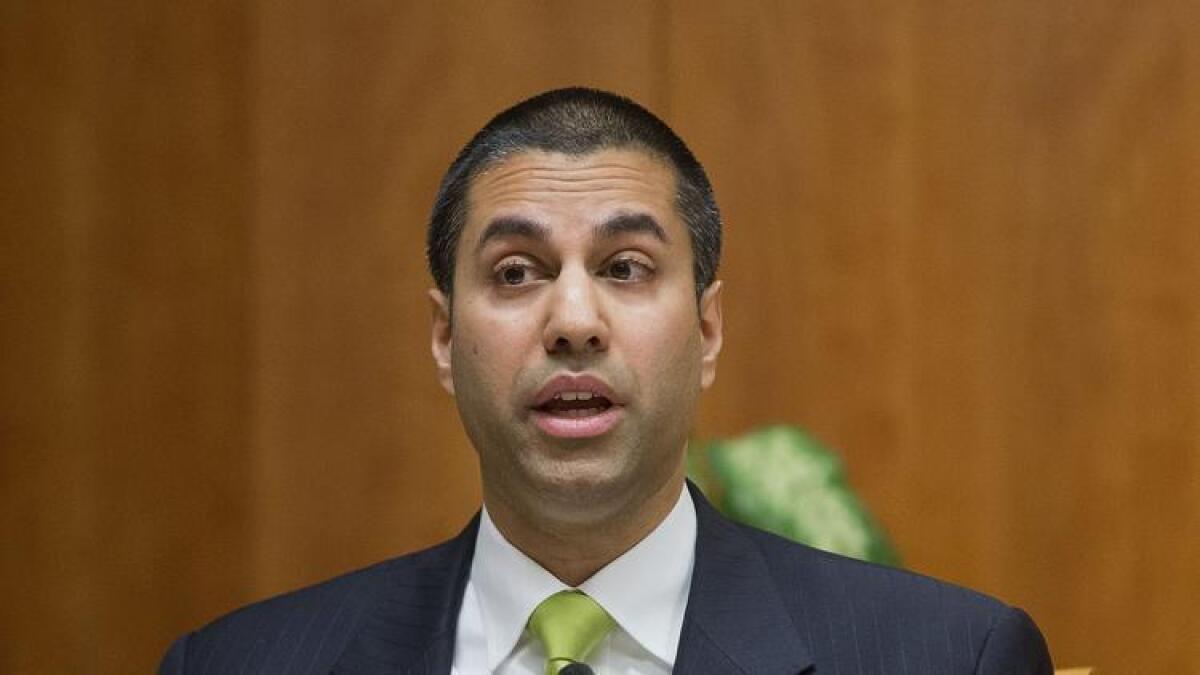Opinion: New FCC chairman gives monthly cable box fees a renewed lease on life

- Share via
You might think it would be easy for political appointees to rally against something as unpopular as the monthly fees that cable and satellite TV services charge for their converter boxes — particularly when federal law requires them to do something about it.
Sadly, the opposite has been true for the Federal Communications Commission, which was instructed by Congress in 1996 to develop rules that would end the effective monopoly that pay-TV providers hold over set-top boxes. Years of work produced a klugey and poorly supported “CableCard” system to allow devices to perform the functions of a cable set-top, but it certainly hasn’t produced the explosion of choices that lawmakers had hoped to create. Good luck finding a TV set with a CableCard slot. Good luck finding anything with a CableCard slot.
In the latest turn of the screw, new Chairman Ajit Pai put the commission’s most recent (and highly controversial) set-top box proposal in limbo, which in this case appears to be a way station on the road to eternal damnation. That proposal would have required pay-TV providers to make their services available through a standardized app that could run on a variety of major consumer-electronics devices.
From a distance, there seemed to be a consensus in Washington around the idea that costly cable boxes and monthly rental fees belonged in the dustbin of history, buried alongside bellbottoms and 8-track tapes. The cable industry’s trade association actually put the idea of an app-based approach on the table in response to a considerably more radical proposal from then-FCC Chairman Tom Wheeler.
The problem, though, was how to make sure that pay-TV operators and their programming partners didn’t use the apps to choke off competition from device makers and other sources of programming and advertising. Wheeler wanted the FCC to be able to certify that the pay-TV operators offered the apps with appropriate licensing terms. But the Hollywood studios in particular saw this as the commission meddling in their negotiations with cable and satellite TV operators and limiting their intellectual property rights. The studios believe copyright law allows them to impose terms not just on pay-TV operators, but on anyone running a pay-TV operator’s app with their content in it.
This divide was impossible for Wheeler to bridge because of the mutual distrust, as proponents and opponents of the rule questioned each other’s intentions. One Democratic commissioner, Jessica Rosenworcel, withheld her support, as did Pai and his fellow Republican, Michael O’Rielly, preventing Wheeler from lining up the three votes necessary for approval. Rosenworcel’s term expired at the end of last year, and Wheeler stepped down when the new administration took over on Jan. 20.
Now, with President Trump signalling a clear distaste for regulations (although his two-for-one order doesn’t apply to independent agencies such as the FCC), the deregulatory-minded Pai is an unlikely candidate for the role of Set Top Box Killer. Instead, he’s likely to let cable and satellite operators continue to strike the occasional deal with the occasional device-maker to deliver their programming via a customized, non-standard app.
And that’s a shame, because there’s a real cost to consumers — more than $230 per year, by FCC estimates — associated with pay-TV set-tops. It’s bad enough that the boxes have always been several steps behind the current state of the technology. But with the advent of TVs, game consoles and Blu-ray disc players that connect to the Internet and support apps, there’s no good justification (aside from profiteering) for requiring customers to rent a set-top box for every TV in the home.
If Pai wants to tap into the populist energy that buoyed Trump, he should put a bulls-eye on set-top rental fees and come up with an apps-based approach that pay-TV companies, programmers and device makers can all live with. But in the current climate in Washington, less is clearly more when it comes to regulation. And that means that the promise Congress made in 1996 will remain largely unfulfilled.
Twitter: @jcahealey
More to Read
A cure for the common opinion
Get thought-provoking perspectives with our weekly newsletter.
You may occasionally receive promotional content from the Los Angeles Times.










